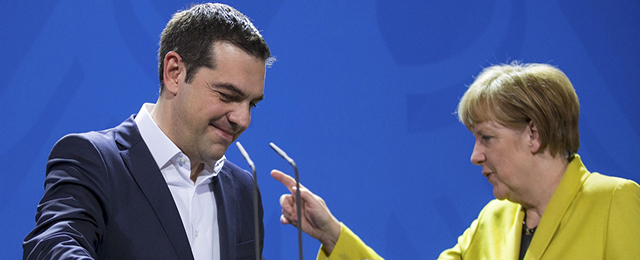Disagreement between the IMF and its European counterparts was delaying talks and providing Greece with a good excuse for refusing to move from its entrenched position. Now Tsipras faces massive pressure to cave in before the deadline for getting extra cash expires at the end of this week.
A couple of days ago, the US Treasury issued a stern warning about the huge instability failure to reach an agreement on the Greek bailout would create. Ms Merkel reacted swiftly to this threat calling a meeting on Monday night with the main public creditors. Yet again, pressure from the other side of the Atlantic seems the only recipe for getting things moving in the Old Continent.
Now we discover that Tsipras was not the only one to blame for the current stalemate. A hidden row between the IMF and the European partners has been revealed. The international agency has few hopes that Greece will meet its targets, so it is demanding its partners rubber stamp a debt restructuring in the event of default. In short, it is passing the buck to Europe to foot the bill should Athens fail. Furthermore, it depicts as totally irrelevant any attempt to impose some degree of fiscal discipline on Greece. It bets instead on sweeping pensions and labour market reforms. The kind of message no European capital wants to hear.
No wonder Ms Merkel has brokered a last minute compromise built on harsh medium-term fiscal requirements, throwing out any hint of debt restructuring. In this way, Europe avoids endless discussions with Greece on concrete reforms to be implemented. By insisting on setting up demanding medium-term public deficit targets, it puts pressure on Athens to take tough action with policies selected by the beneficiary. Should Athens agree to such requirements, it will bear the burden of cutting off expenditure lines at its own will. Pensions is the only area where a balanced result should be reached at all costs. A tiny concession to the IMF’s extensive shopping list.
In exchange for tough medium-term conditions on primary surpluses, ranging around 3.5%, Greece would benefit from an immediate €7 billion installment. In addition, extensive arrangements would be made to keep it afloat over the summer until a new bailout deal is struck. And €10 billion earmarked for banking support would feed into the conventional rescue plan. This scheme would provide Athens with a welcome respite before it embarks on bitter discussions to broker the new bailout programme. And the Eurozone would also get rid of an annoying problem for several months to come.
Tsipras should seize this opportunity to avoid default at little short-term cost. Nonetheless, he will face a lot of resistance back home, regardless of the evidence that he should receive far more support than his predecessor in exchange for less harsh sacrifices in the future. Irrespective of the political price likely to be borne, he should accept a deal which is the best compromise he could ever dream of.






Be the first to comment on "Merkel steps into the Greek imbroglio"